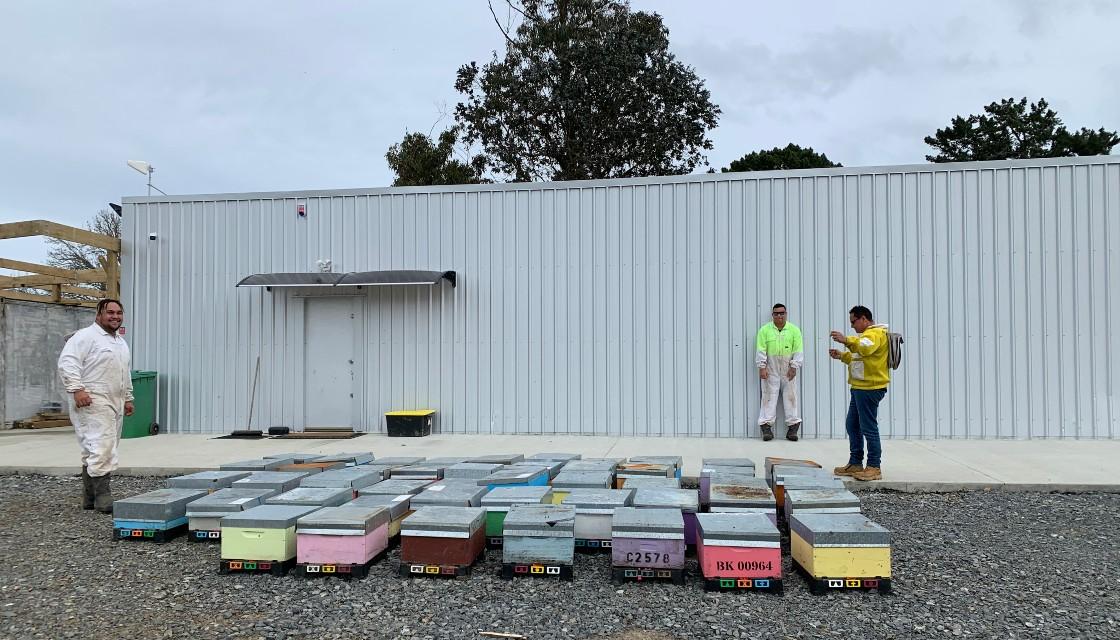
Millions of bees have starved to death after COVID-19 checkpoints in and out of Auckland caused a delay in beekeepers accessing their hives.
Wetex Kang of Waitakaruru Honey Limited says around 2.5 million bees died after workers were unable to travel from Waikato to Auckland to feed the bees.
Kang, who is based in Auckland, says many of his business' 2000 beehives are scattered across the North Island, as are the staff who care for them.
He says although his beekeepers, who are based in Waikato, managed to access the hives in the first few days after alert level 3 was declared in Auckland, that changed after checkpoints became stricter.
After trying unsuccessfully to get to their hives located near Helensville numerous times over the weekend they eventually got through on Monday morning, but by then it was too late.
"We finally got to the bees and they were all dead," Kang told Newshub.
He said 47 hives - adding up to approximately 2.5 million bees - had starved to death.
Kang said after the new lockdown was first announced he assumed that beekeepers would be treated as essential workers and allowed to travel freely to do their jobs as they had during alert level 4 earlier this year.
However, beekeepers currently need a letter from the Ministry of Health to prove they have been granted permission to travel.
Karin Kos, chief executive of Apiculture New Zealand, says the organisation has had multiple calls from beekeepers who had been turned back while attempting to access their hives both in and out of Auckland.
"At this stage apiculture workers, along with other primary sector workers operating as part of essential services businesses, do not have an official exemption to travel across the Auckland boundary," Kos told Newshub.
"Apiculture New Zealand has applied to the Ministry for Health for an exemption on behalf of commercial beekeepers, who are increasingly concerned about accessing beehives to manage bee health at this critical time of the season. Those beekeepers who provide pollination services are also anxious as their business requires transporting beehives at short notice."
She said although the organisation's application had support from the Ministry for Primary Industries it had yet to receive a response from the Ministry of Health.
"We’ve been clear in our application that beekeepers have committed to having no contact with the public or landowners when they carry out their work across the borders."
Kang says his organisation has lodged an application for travel exemption but was also still waiting for permission to be granted.
"We put in our application on Monday at midday and ever since then I've been sending them desperation emails like 'our bees are starving please help us'. Every day is a maybe for us," he said.
Health Minister Chris Hipkins on Thursday told reporters the Ministry of Health had received 7000 applications for travel exemptions, with more than 1000 granted and around 100 declined. That was up from 5000 applications earlier this week.
Hipkins said the ministry was working as quickly as possible to process the applications and asked for patience for those waiting for an answer.
But Kang was questioning why the Government needed to change the system from the previous lockdown, saying the result was causing unnecessary hardship for businesses like his.
"When things are actually working ok during level 4 why would you change it during level 3 and have the Ministry of Health process 5000 applications that were previously deemed essential workers? It just doesn't make sense."
Kang estimated the lost bees had cost him more than $20,000 and said he had concerns other businesses would also be struggling due to the consequences of the checkpoints.
"We know there are other people just as desperate as we are."


